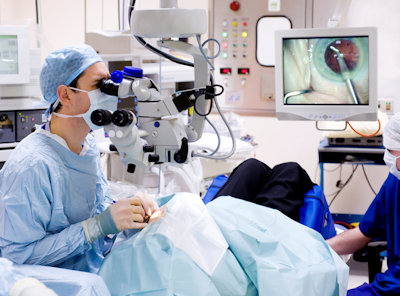We all age. It’s inevitable, but we don’t often realize that our eyes are aging too. Cataracts are a natural part of that aging process. In fact, aging is the number one factor that will determine whether you have a cataract. If you are over age 65, you have a 20 percent chance of already having a cataract, according to data from the National Institute on Aging, and you may be experiencing cataract symptoms.
Symptoms
 Even if you have a cataract, you may not know it. People with cataracts generally have no symptoms in the early stages of the protein breakdown. The reason for this is that cataracts develop slowly, taking years to fully form. At first, the cataract affects a small portion of the lens, so you may not have symptoms.
Even if you have a cataract, you may not know it. People with cataracts generally have no symptoms in the early stages of the protein breakdown. The reason for this is that cataracts develop slowly, taking years to fully form. At first, the cataract affects a small portion of the lens, so you may not have symptoms.
Cataracts are not a disease. The eye lens is made up of proteins, and as people age, these proteins break down, clump together and cloud the lens. Cataracts start small, only affecting a small part of the lens, therefore most people do not realize they have cataracts because their vision is not affected.
Over time, as more proteins break down and deposit on the lens, people usually begin to notice cataract symptoms. Eventually, the cataract further clouds the lens, and incoming light cannot reach the pupil, therefore vision is not as clear. People usually first notice changes in night vision, and describe halos forming around oncoming headlights. Distance vision may also degrade. Other common cataract symptoms are:
- Cloudy or blurry vision
- Dim or dull vision
- Faded colors
- Poor night vision
- Light sensitivity
- Frequent vision prescription changes
Risk Factors
Getting older is the primary risk factor for cataracts, but there are other risk factors. Smokers and alcohol drinkers are more likely to develop cataracts. Chronic health issues like high blood pressure, obesity and diabetes also increase risk. If you have had previous eye surgeries or past eye injuries, you might be more susceptible to developing cataracts. People with a family history of cataracts are also more likely to have cataracts themselves.
Cataracts are not preventable, but we can take steps to slow the progression. At first, we can change your glasses or contact lens prescription more frequently to adjust for the cataract. Eventually, surgery is inevitably needed to permanently correct the issue.
We perform this safe and effective outpatient surgery by replacing the clouded lens with an artificial lens implant. The implant, referred to as an intraocular lens implant (IOL), functions just like your eye’s natural lens does, and we can even fit you with a vision-correcting lens. The procedure is quick and painless and can be completed in an hour in our outpatient facility.
If your vision has become blurry or you’ve had trouble seeing at night, you might have cataracts. If you have started noticing issues with night or distance vision, or you have experienced any of these other cataract symptoms, come in for a visit to Elmquist Eye Group. We have convenient locations in both Fort Myers and Cape Coral, and our expert team will provide you with the best possible eye care.
